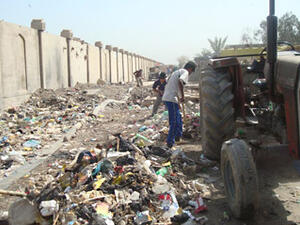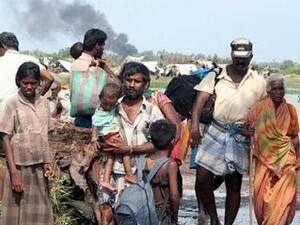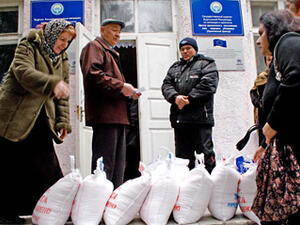Feature: "God Bless Our Homeland"
Feature: "God Bless Our Homeland"

Some of these Afghan refugee children heading home through Iran's Zahedan Voluntary Repatriation Centre have never known Afghanistan.
TEHRAN, Iran (UNHCR) - At Suleimankhani Voluntary Repatriation Centre in Tehran, an extended family of 25 Afghans waits to board the bus to the border crossing with Afghanistan at Dogharoun. They are all Shia Muslims whom Taliban forces threatened to kill if they stayed in Kabul.
"That's why we decided to take refuge in Iran," says Ahmad, who believes Afghanistan is now secure enough for them to go back. "Finally there is peace in our homeland. And Afghanistan needs us to rebuild it."
The family arrived here six years ago. Ahmad's elderly mother, Malek, says the family got on well in Iran. "For that I thank the Iranian people and the Iranian government," she says. "But the war is over in Afghanistan and we are going back to live peacefully now in Kabul, where we were born. I am glad to be going home. God bless our homeland. God bless Iran. God bless all of us."
But others are less sure where "home" really is. Afghans have been coming to Iran in waves since the late 1970s. In 2001 - just a few months before the overthrow of the Taliban - 2.35 million Afghans took part in an Iranian government registration exercise. While most of those in Iran who are now going home through the UNHCR-assisted voluntary repatriation programme had fled the Taliban, possibly one-third of the Afghans had taken refuge here during the communist era in Afghanistan, which began with the Soviet invasion in 1979. For them, Afghanistan is a distant memory and repatriating literally means packing up a lifetime.
Rahmin is now in his mid-30s, married with two children. In 1983, he was sitting his high school exams when the conscription order arrived. "Military service back then meant you got sent straight to the battlefield. It meant almost certain death." He was 17 when he fled across the border from Herat to Mashad in Iran. "We were young when we came here," he says. "Our families - our parents - followed us.'
Rahmin's story is typical. Almost two-thirds of the Afghans registered in Iran are men. Many left wives and children behind in Afghanistan - some of whom subsequently followed them to Iran. Or, as in Rahmin's case, they came as young single men. In Iran they married - sometimes to Iranian women - and raised their families. Some of their dead have been buried here.
Ali's story is typical too. He is a child of Afghans who arrived all those years ago. Now in his teens, he has just completed 10th grade at school in Iran. He is at the Dogharoun border exit station, within walking distance of Afghanistan - the land of his birth but not where he has grown up. His expression belies mixed emotions. "I'm happy to be going back. But I'm anxious too. I know the culture here. Afghanistan is different ... "
Afghans like Rahmin and Ali find themselves betwixt and between two countries. The historical links between Iran and Afghanistan are strong - Persian and one of Afghanistan's official languages, Dari, are almost identical. Both countries lie strategically placed on the key trading route between east and west. Traffic of people and goods has been constant down through the ages. Today, very few of the Afghans in Iran live in refugee camps. They live in the cities, usually grouped in communities, but among and alongside Iranians. They have integrated. They and their children have been educated here.
But the pressure to leave is increasing.
Iran has shown undoubted generosity towards the Afghans. It has dealt with the humanitarian fallout of its unlucky neighbour for many years. Now, however, Iran considers that the situation in Afghanistan has changed sufficiently for the better and that the time has come for its many Afghans to go home.
It is becoming more difficult for Afghans to rent accommodation and hold down jobs. The labour law, introduced just last year, penalises employers who hire illegal workers - and most of the Afghans working in Iran do so illegally. It is virtually impossible to get a work permit. But who would do the jobs that the Afghans do and how would the departure of a huge number of Afghans affect the Iranian economy?
Shahvali is 24. His father left Afghanistan when the Soviets arrived. He and his four brothers were born in Sistan-Baluchistan, Iran's poorest province. They are on the bus to the southern border crossing at Milak, heading back to Nimroz from where their parents originally came. "We have nothing here and nothing over there," he says. "Here we're being harassed every day. What's the point in staying?"
But is it possible for the vast number of Afghans outside their homeland to return all at once? The answer, clearly, is no.
Many, such as the large ethnic Hazara population in Iran, came originally from some of the most devastated areas in Afghanistan. Places like Bamyan, site of the destroyed Buddha statues in the heart of the Hindu Kush close to the ancient Silk Road. Mythical places the Taliban turned into a wasteland because the inhabitants were Shia - like the Iranians. Places that need time to recover.
And then there are the practical difficulties of packing up lives rebuilt over 20 years.
Asking landlords if they can break leases and retrieve rent paid months up front - as is normal in Iran. Wondering whether the children will be able to continue their schooling if they go back. Where to live? How to earn a living?
Rahmin and some Iranian friends run a small business in Mashad. He and his Iranian co-workers have been talking about expanding their trade into Afghanistan. "If I can find work, yes, I would like to go back. But I wouldn't take my family - not yet. Not until I have found a house and a means of taking care of them."
Since April this year, almost a quarter of a million Afghans have gone home from Iran - three-quarters of them with assistance from UNHCR. The process has been gradual and paced. And it needs to continue that way. Particularly for those who have been here so long and face the challenge of starting anew - all over again.
By Laura O'Mahony, UNHCR Iran
with additional reporting by Mohammad Nouri









